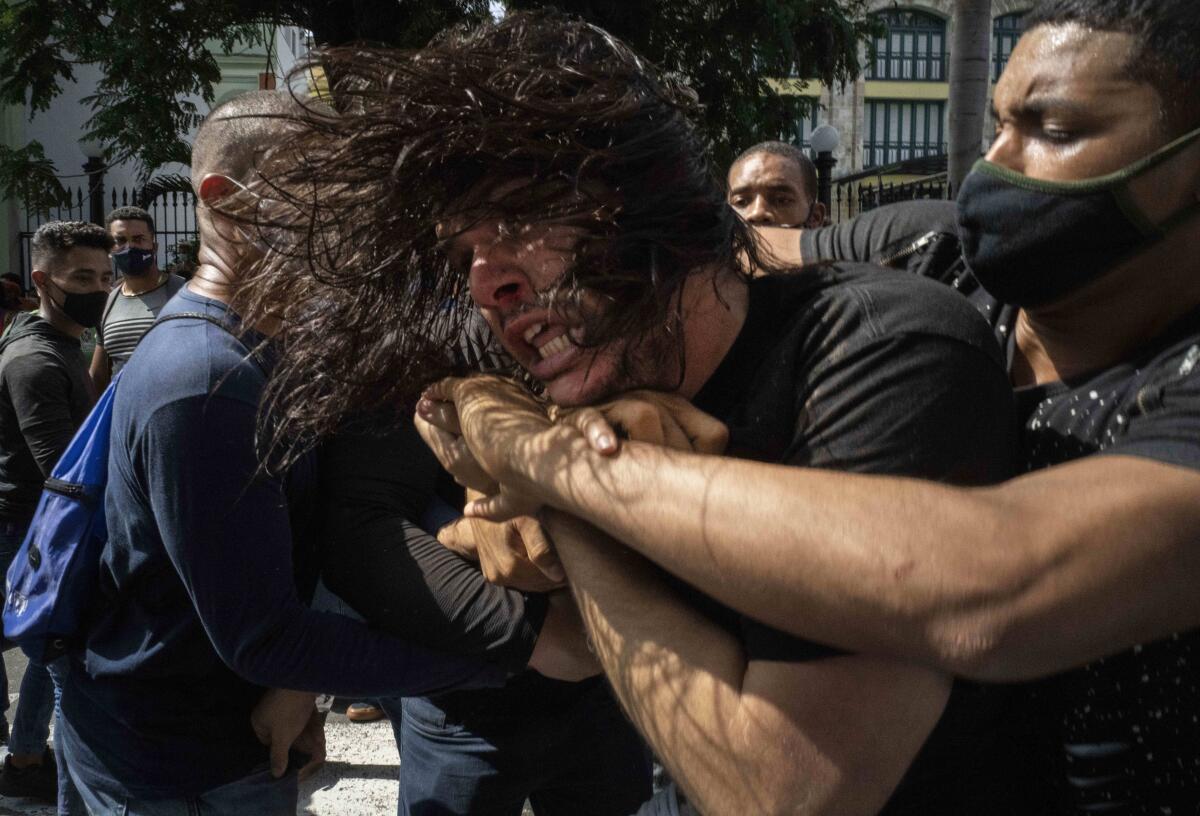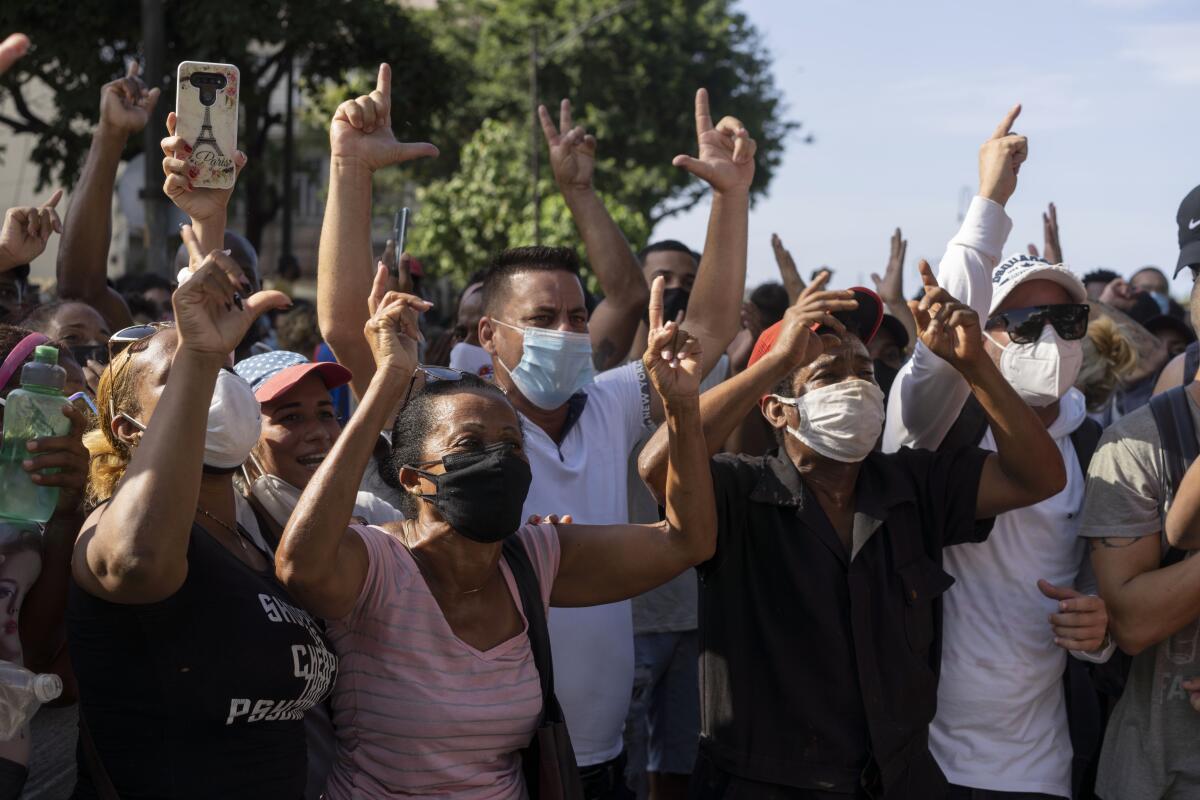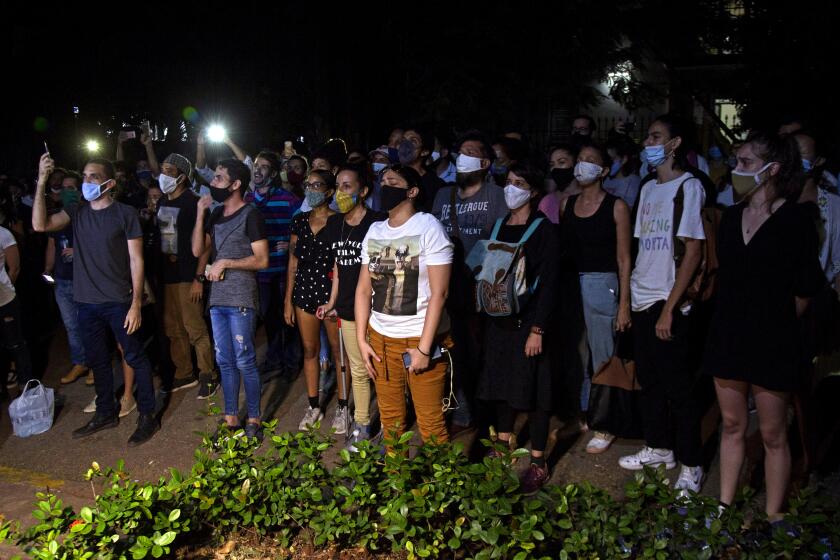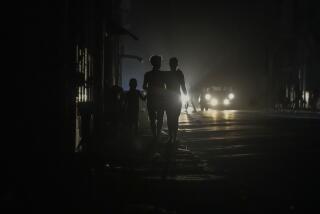Biden says U.S. stands with Cuban protesters, but officials deflect policy criticism

- Share via
WASHINGTON — U.S. officials Monday pledged to “stand firmly” with Cubans who have unleashed a rare, robust wave of protest and called on the Havana government to refrain from a violent crackdown, even as authorities there shut down the internet and deployed counter-demonstrators into the streets.
“The Cuban people are demanding their freedom from an authoritarian regime,” President Biden said, deeming it a “clarion call” for liberty. “I don’t think we’ve seen anything like these protests in a long, long time, if, quite frankly, ever.”
Speaking at the White House, he called on Cuban authorities to “hear their people and serve their needs.”
Biden and other U.S. officials, however, avoided accepting any responsibility for the dire conditions that so plague Cuban residents and deflected criticism for the administration’s slow process in the promised defrosting of the U.S. relationship with Cuba.
In the early days of his administration, Biden and his advisors said they would begin to relax some of the harsh measures imposed by former President Trump, who in turn was reversing an opening overseen by his predecessor, former President Obama.
Obama had reestablished a U.S. Embassy in Havana, allowed travel and trade and made the first trip to the island by an American president in nearly 90 years.
The Biden team, while not planning a full return to the Obama era, pledged to revive travel between the U.S. and Cuba and make it easier for Cuban Americans to send desperately needed remittances to their relatives on the island.
Nearly six months later, that has not happened. Secretary of State Antony J. Blinken reiterated Monday that a “policy review” continues, with focus on democracy and human rights on the island.

That sentiment was echoed by numerous people who advocate for closer ties between Washington and Havana.
“The Biden administration now owns the Trump policy of deprivation, the logic of which is to foment the shortages and street protests that we are witnessing in Cuba today,” Peter Kornbluh, a Latin America analyst and coauthor of “Back Channel to Cuba,” a book recounting Obama’s secret negotiations with Cuba, told The Times.
President Biden’s initial actions lifting Trump-era restrictions on Cuba won’t immediately restore President Obama’s warmer relations with the island.
Blinken, however, said critics were misreading the situation.
“It would be a grievous mistake for the Cuban regime to interpret what is happening in dozens of towns and cities across the island as the result or product of anything the United States has done,” Blinken said. “It would show they simply are not hearing the voices and will of the Cuban people” who he said are “deeply, deeply, deeply tired” of repression and economic and pandemic mismanagement.
Advocates for better ties with Cuba are dismayed that no progress has been made.
For Biden, according to people familiar with his thinking, the calculation is that rapprochement with Cuba would provide few political benefits now but harbored potential downsides.
The administration is under pressure from Cuba hawks in Congress, including the powerful Democratic head of the Senate Foreign Relations Committee, Sen. Robert Menendez of New Jersey, to maintain the status quo where the island is concerned. Trump’s hard line on Cuba probably helped him win Florida in his unsuccessful bid for reelection in 2020, thanks in part to conservative Cuban immigrants who make up a sizable voting bloc.

Menendez was among several, mostly conservative American lawmakers who on Monday applauded what the senator called a “historic day” of Cuban demonstrations.
“Despite ongoing persecution on the island, Cubans are bravely joining to demand nothing more than the ability to live safely and speak their minds, freely, openly, and without fear,” Menendez said in a statement. “Listen to their cries of desperation. Support their demands by ensuring we do not perpetuate the regime’s decades of repression.”
In Havana, meanwhile, Cuban President Miguel Díaz-Canel, the first person not named Castro to rule the island in more than half a century, went on national television Monday for a four-hour exposition. He blamed the Sunday protests — in which thousands of Cubans demanded freedom, food and medicine — on a handful of “counter-revolutionaries.”
In the appearance that included Foreign Minister Bruno Rodriguez and the entire Cabinet, the Cubans also blamed “U.S.-financed mercenaries” for staging what they portrayed as a social media ploy, likely out of South Florida, to incite the crowds. Díaz-Canel on Sunday urged his supporters into the streets to “combat” on behalf of the revolution, chilling words for many observers.
“We’ve seen how the campaign against Cuba was growing on social media in the past few weeks,’’ Díaz-Canel said, according to wire services. “That’s the way it’s done: Try to create inconformity, dissatisfaction by manipulating emotions and feelings.”
Police were patrolling city streets Monday, and internet service was intermittent, news reports said.
Even as the Biden administration moves slowly on relations with Cuba, Havana also has bigger demands. For decades it has sought the lifting of the U.S. embargo imposed on Cuba by President Eisenhower more than 60 years ago, which limits trade, business and much diplomacy. It can be ended only by Congress.
In recent weeks, Cuban officials also began lobbying the Biden administration to remove the country from the U.S. list of “state sponsors of terrorism.” Trump placed Cuba on the list — where it sits alongside Iran, North Korea and Syria — in January as a parting shot before leaving office. Removing a country from the list is also a complicated process.
State Department spokesman Ned Price said Monday for the first time that consideration of the terrorism-sponsor designation is being evaluated separately from the broader review of Cuba policy. He said it would be separate but parallel, which has unknown implications for how either process might end or in what amount of time.
The massive demonstrations Sunday were unlike anything seen on the island since the 1990s. That so-called special period was a time of enormous hardship and shortages in Cuba following the collapse of its main patron, the Soviet Union. It led to an exodus of Cubans fleeing by raft to the U.S. in 1994, with an estimated 35,000 Cubans reaching Florida’s shores.
More to Read
Get the L.A. Times Politics newsletter
Deeply reported insights into legislation, politics and policy from Sacramento, Washington and beyond. In your inbox twice per week.
You may occasionally receive promotional content from the Los Angeles Times.













